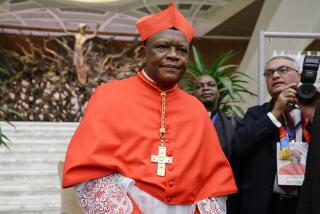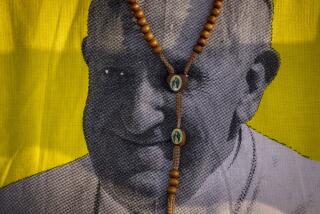Conference Highlights Anglican Unity, Diversity
- Share via
CANTERBURY, England — In their three-week Lambeth Conference that ends here today, the bishops of the world’s Anglican churches discovered that although they were capable of solidarity in the cause of economic justice and religious freedom, they were also subject to wrenching differences over issues such as homosexuality, how the Bible is to be interpreted, and the role of women in the church.
The day after a tense debate and vote that reasserted the Anglican Communion’s opposition to “homosexual practice,” the bishops celebrated the Eucharist as both a sign of unity and a reminder of division.
“We who are many are one body for we eat this one bread,” the celebrants intoned, repeating the ancient liturgical formula reminding all present of their common calling to love one another and to follow their Lord.
*
To look around the sports arena that served as a makeshift church for more than 700 of the world’s Anglican bishops meeting at the University of Kent was to see those sacred words made real.
There were Europeans and Americans, Africans and Asians and those from Central and South America, Australia and the Pacific islands. Japanese bishops led the service. Most of the bishops wore identical clerical collars and magenta shirts, a color symbolizing their clerical rank. All partook of a common ceremonial chalice.
But while the Eucharist symbolized the unity of the 70-million-member worldwide Anglican Communion, which includes the Episcopal Church in the United States, the debates of the closing days of the once-a-decade conference made the bishops acutely aware of the challenges they face leading a global and multicultural church.
On one hand, bishops said, they can work to reach out and assist each other as never before.
The men and women in episcopal purple represent a rainbow of cultures, nationalities and ethnic groups in 160 countries. Meetings such as the Lambeth Conference, they said, brought them together in small, intimate groups for prayer and Bible study, putting a face on impersonal statistics of debt and poverty and demanding a response that is accountable to their shared faith.
“We heard stories of how a faithful hearing of Scripture in South Africa encouraged the steadfastness that overcame the . . . false use of Scripture to uphold apartheid,” Los Angeles Bishop Frederick H. Borsch said in a major address to the conference.
“We heard stories of churches being burned by fundamentalists of other religions, and of an Anglican priest and his family reaching out to help Christians of another denomination even while their own church and home were still in flames,” he said. “We heard from a bishop whose daughter was killed in a car bombing, of a poor diocese in South America taking up collections for disciples in Rwanda.”
On the other hand, in a world made smaller by technology and mass communications, Western bishops also heard complaints from their colleagues in Third World nations that a decision by a bishop in a rich country like the United States to ordain a gay man or lesbian is quickly flashed around the world and can have repercussions elsewhere.
In Africa and Asia, where Anglican and other Christian churches are frequently competing with Islam for adherents, decisions in the West on issues such as gay rights can be an opportunity for opponents of the church to undermine its efforts and even persecute its believers, Third World bishops said.
The conference’s resolution reaffirming the Bible’s denunciation of homosexual behavior would help the church in Muslim countries, and “reassure our ecumenical partners” in the Roman Catholic church, the Archbishop of Canterbury, George L. Carey, said Friday.
But the resolution has angered liberals within the church. In an interview Friday, retired Bishop Otis Charles of San Francisco, who in 1993 became the first American bishop to declare his homosexuality, said he was “astonished” by arguments such as Carey’s.
The idea suggests “we should oppress women . . . because it would help Christians in those countries where women are limited,” he said. “To build the mission of the church on injustice . . . struck me as remarkable.”
Another point of contention is the ordination of women. The U.S. Episcopal Church has been ordaining women for 20 years. But other provinces in the worldwide Anglican Communion continue to limit the priesthood to men, as do the Roman Catholic and Eastern Orthodox churches.
On Thursday, with traditionalists securely in control here, the conference approved a resolution saying that traditionalist bishops in America and elsewhere should not be compelled to ordain women. That advisory resolution contradicts--but does not override--a law in the U.S. Episcopal Church passed at its General Convention last summer in Philadelphia, which will require U.S. bishops to comply with the national church’s decision to ordain women.
These controversies, of course, involve more than just differing views of the church’s needs in differing nations and more, too, than simply differing cultural perceptions of sexual mores.
Underlying the controversies are differing--often radically divergent--readings of what the Bible says.
Traditionalist bishops read the Scriptures in a literalist fashion.
The biblical book of Leviticus and the New Testament epistles to the Romans and Corinthians all contain statements declaring sexual relations between men to be sinful. Considering such statements, traditionalist bishops declare, simply, that “the Bible says what it says.”
*
Liberal bishops, by contrast, argue that modern readers have a right to take the cultural and societal circumstances of biblical times into consideration when they interpret the verses. Leviticus, they note, includes condemnations of many practices that ancient Israel considered taboo but that modern Christians do not. And New Testament verses denounce homosexuality as an unbridled passion--a condemnation that might not apply to a caring, committed homosexual relationship, they argue.
Also at stake in the controversies was the issue of authority within the Anglican Communion. In each case, some bishops wanted to bring uniformity and accountability throughout the whole communion when it comes to discipline, practice and teachings on matters such as sexuality and the role of women in the church.
Such accountability, however, is controversial because the communion’s 37 national churches or provinces are self-governing, and bishops have always had the last word on what goes on in their own diocese.
The Anglicans have no equivalent to the Roman Catholic pope. Instead, what binds the communion together is a set of core doctrines, a belief that their bishops share in the historic episcopacy, a recognition of the Archbishop of Canterbury as a spiritual--but not jurisdictional--leader, and participation in various international Anglican bodies, such as the Lambeth Conference.
Despite the problems they confronted, the Lambeth meetings also demonstrated how interdependence and voluntary cooperation can work. Support for relieving Third World debt was an example.
Confronted with personal testimony by Third World bishops about the poverty they see each day, the conference, almost unanimously, urged the world’s rich nations, the International Monetary Fund and the World Bank to forgive the debts of developing nations. Some undeveloped countries must earmark 40% of their budgets to pay back creditors before they can spend money to meet basic human needs, the bishops said.
In meetings with the president of the World Bank and other key figures, bishops argued that the year 2000 would be a good time for debt forgiveness. They took as precedent the scriptural Jubilee year--an occasion once every 50 years during which, according to the Bible, the people of Israel were commanded to return land to its original owners and free slaves.
Carey said 1.3 billion people in the world live on less than $1 a day. About 100 million go hungry every day. The World Health Organization has called the deaths of 11 million children each year from easily treatable diseases “silent genocide.”
Of the world’s 20 most indebted low-income countries, 16 are in Africa, and among them they owe $100 billion, Carey said. Borsch, the Los Angeles bishop, said most of those countries have already paid their original debt many times over in interest but have been unable to significantly reduce the principal.
Borsch, a New Testament scholar and author, laid out the theological underpinning for the bishops’ attempts at cooperation in a report to the convention titled “Called to Be a Faithful Church in a Plural World.
“We are interdependent participants in the same body as we continue to share in Christ’s work in the world. Some may be chosen to represent and lead the body in various ways,” Borsch wrote, “but there remains fundamental unity and equality in the one body.”
More to Read
Sign up for Essential California
The most important California stories and recommendations in your inbox every morning.
You may occasionally receive promotional content from the Los Angeles Times.













